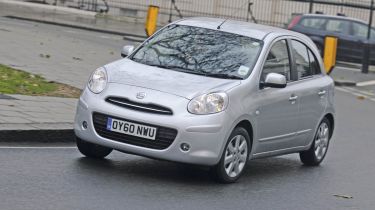Nissan Micra 1.2 Acenta
Is Japanese giant’s ‘world car’ a world beater?
For nearly three decades, Nissan’s Micra has been a big name in the small car sector. With its cheeky looks, robust mechanicals and low running costs, the model has proved a huge hit with buyers who want a fuss-free inner-city runabout.
The fourth-generation car aims to build on its predecessor’s considerable success. Bigger and better equipped, the all- new Micra should have all the right ingredients to go down a storm in the showroom. Other highlights include lightweight construction and an efficient new 1.2-litre three-cylinder engine, which combine to promise lower fuel consumption and CO2 emissions than before.
Video: watch CarBuyer's video review of the Nissan Micra
[[{"type":"media","view_mode":"content_narrow","fid":"68625","attributes":{"alt":"","class":"media-image"}}]]
Despite major changes under the skin, Nissan’s designers have played it safe with the styling, which is far from cutting-edge. With its ungainly proportions and awkward detailing, the Nissan has lost the cute appeal of its predecessor. Neither does it match the upmarket look of the stylish new Suzuki Swift.
Climb aboard and it’s clear that bosses have dictated a similar design approach inside. On the face 0f it, the bold shapes and chunky switchgear add some visual flair. Look closely, though, and the cracks in the Micra’s make-up begin to appear.
Used - available now

2023 Polestar
2
28,503 milesAutomaticElectric
Cash £23,100
2022 Nissan
Qashqai
21,203 milesManualPetrol1.3L
Cash £19,000
2022 Toyota
Corolla
14,897 milesAutomaticPetrol1.8L
Cash £16,663
2024 Volkswagen
Golf GTD
10,576 milesAutomaticDiesel2.0L
Cash £26,697Clear cost-cutting measures mean the quality lags far behind that of class leaders. Hard, shiny plastics are used throughout, while some trim still has sharp edges left over from the moulding process – particularly on the glovebox lid and internal door handles.
Elsewhere, the dials look dated and the switches don’t operate with the precision we have come to expect from Nissan. There is also no steering column reach adjustment, so finding the perfect driving position is more difficult than in either the Hyundai or Suzuki. And although the silver finish used for the centre console helps to brighten the interior, it looks cheap.
While the Nissan’s cabin feels low-rent, the overall kit count is sky high. Even in mid-range Acenta specification you get big-car luxuries such as cruise control, Bluetooth connectivity, climate control and a leather-trimmed steering wheel. All this equipment will cost Swift buyers extra.
In fact, the Micra is so well specced that the list of available options is restricted to metallic paint (£400) and the Nissan Connect system (£400). The latter combines touchscreen sat-nav with a six-speaker stereo upgrade, although if you choose the route-finding kit, you’ll discover that the 12V power socket has been deleted from the centre console. Nissan claims there’s no need for it, as owners can charge electrical items such as mobile phones through the standard-fit USB slot. But that won’t suit everyone.
Regardless of the options you choose, there’s a decent amount of space in the cabin, with rear occupants enjoying marginally more head and legroom than in the still-spacious Hyundai i20. Stowage is taken care of by a large double glovebox, while the centre console and front door bins feature useful cup-holders.
Open the tailgate and you will uncover a 265-litre load bay, which has a healthy 52-litre advantage over the Suzuki’s cramped boot. If you flatten the split-fold rear bench, the capacity increases to a useful 1,132 litres.
At present there’s only one engine option for the Micra – an all-new 1.2-litre three-cylinder petrol unit. While it cannot match its four-cylinder rivals for refinement, it feels keen at low speeds and has a characterful note.
However, it’s not the best performer – the Micra trailed both its opponents against the clock: its 17.4-second 50-70mph time in fifth gear was the slowest of our trio.
Bosses claim the all-new car has been developed with crowded urban streets in mind, and initial impressions back this up. The steering is light and direct, while visibility is excellent. A tight turning circle of 9.3 metres adds to the feeling of agility in town.
Sadly, the Micra’s driving dynamics are undermined by its suspension – which delivers a firm low-speed ride – plus a slack gearshift and brakes which lack the stopping power of rivals here. By comparison, the polished Swift and Hyundai feel like models from the class above.
Overall, the Nissan’s biggest problem is its below-par quality. Look past the brilliant value and long kit list, and you’ll find a car that has been built to a price. In many areas, it doesn’t even improve on the model it replaces – and in such a competitive sector, that spells trouble.
Details
Chart position: 3
WHY: All-new Micra is designed to appeal to world markets. But will this global ambition cost it dearly on British roads?







